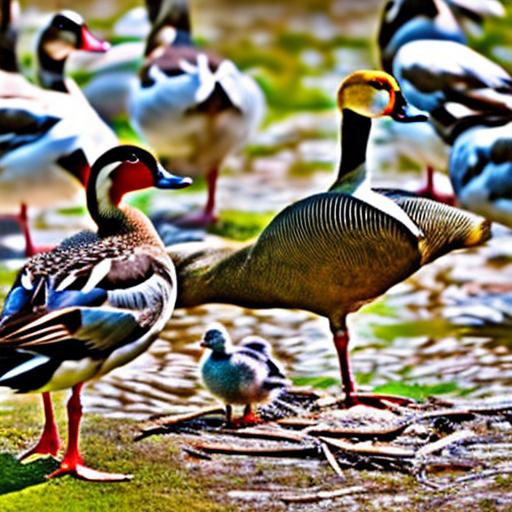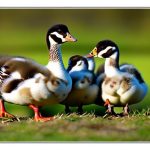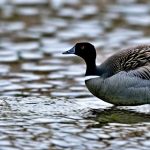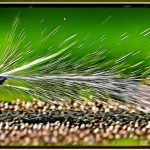Raising ducks and geese together can be a rewarding and enjoyable experience for poultry enthusiasts. Both ducks and geese are social animals that thrive in the company of others, so keeping them together can provide them with companionship and a sense of security. Additionally, ducks and geese have similar housing and dietary requirements, making it easier to care for them in a shared coop. In this article, we will explore the benefits of raising ducks and geese together and provide tips for successfully managing a mixed flock.
One of the main benefits of keeping ducks and geese together is the social interaction they provide for each other. Ducks and geese are highly social animals that form strong bonds with their flock mates. By keeping them together, you are providing them with companionship and reducing the risk of loneliness or boredom. This can lead to happier, healthier birds that exhibit natural behaviors such as preening, swimming, and foraging.
Another benefit of raising ducks and geese together is the added security they provide for each other. Geese are known for their loud honking and aggressive behavior towards potential threats, which can help deter predators from approaching the flock. Ducks, on the other hand, have a keen sense of alertness and can quickly spot any potential danger. By combining these two species, you create a more vigilant and protective flock that is less vulnerable to predation.
Key Takeaways
- Ducks and geese can be raised together in a shared coop.
- Adequate space and proper housing are important for both ducks and geese.
- Feeding both ducks and geese in a shared coop requires careful consideration of their dietary needs.
- Some duck and goose breeds are more compatible than others.
- Ducks and geese have different behaviors that should be taken into account when raising them together.
Housing Requirements for Ducks and Geese
When it comes to housing ducks and geese together, there are a few important considerations to keep in mind. First, you will need to provide a coop that is large enough to accommodate both species comfortably. Ducks and geese require ample space to move around, stretch their wings, and engage in natural behaviors. A good rule of thumb is to provide at least 4 square feet of floor space per bird.
In terms of coop design, it is important to choose a structure that is secure and predator-proof. Ducks and geese are vulnerable to a variety of predators, including raccoons, foxes, and even neighborhood dogs. Make sure the coop has sturdy walls and a secure roof to prevent any unwanted visitors from gaining access. Additionally, consider installing hardware cloth or wire mesh around the perimeter of the coop to further deter predators.
Proper ventilation and lighting are also crucial for the health and well-being of ducks and geese. Good ventilation helps remove excess moisture and ammonia from the coop, which can lead to respiratory issues if left unchecked. Install windows or vents that can be opened and closed as needed to regulate airflow. Similarly, provide adequate lighting to ensure that the birds have a consistent day-night cycle. This can be achieved by using natural light or by installing artificial lighting in the coop.
Keeping the coop clean and dry is essential for maintaining the health of your ducks and geese. Both species produce a significant amount of waste, so it is important to regularly clean out the coop to prevent the buildup of ammonia and bacteria. Remove soiled bedding and replace it with fresh material on a regular basis. Additionally, make sure the coop has proper drainage to prevent water from pooling inside.
Feeding Ducks and Geese in a Shared Coop
While ducks and geese have similar dietary needs, there are some differences that need to be taken into account when feeding them in a shared coop. Ducks are omnivores that require a balanced diet consisting of both animal protein and plant matter. They enjoy foraging for insects, snails, and worms, so providing access to a grassy area or allowing them to free-range can help supplement their diet.
Geese, on the other hand, are primarily herbivores that graze on grasses and other vegetation. They have a slower metabolism compared to ducks and require less protein in their diet. However, it is still important to provide them with a balanced feed that meets their nutritional needs. Look for a commercial feed specifically formulated for waterfowl, or consult with a poultry nutritionist to create a custom diet for your birds.
When feeding ducks and geese together, it is important to ensure that each bird has access to the appropriate food. Ducks have a tendency to eat quickly and can monopolize the feeding area, leaving the geese without enough food. To prevent this, consider using separate feeding stations or providing multiple bowls or troughs for the birds to eat from. This will help ensure that each bird gets their fair share of food.
Fresh water is also essential for the health and well-being of ducks and geese. Both species require access to clean, fresh water at all times for drinking and bathing. Ducks in particular need water to help them digest their food properly. Make sure to provide a shallow dish or container that is large enough for the birds to submerge their heads in. Change the water regularly to prevent contamination and keep it clean.
Compatibility of Duck and Goose Breeds
When it comes to raising ducks and geese together, it is important to consider the compatibility of different breeds. While most duck and goose breeds can coexist peacefully, there are some exceptions. Some breeds of ducks and geese are more aggressive or territorial than others, which can lead to conflicts within the flock.
In general, it is best to choose duck and goose breeds that have similar temperaments and social behaviors. For example, Muscovy ducks are known for being calm and docile, making them a good choice for mixed flocks. Similarly, Embden geese are known for their friendly and sociable nature, which makes them compatible with a variety of duck breeds.
When introducing new birds to the flock, it is important to do so gradually and under supervised conditions. Ducks and geese are highly territorial animals that can become aggressive towards newcomers. To minimize the risk of conflicts, consider using a separate enclosure or pen to introduce the new birds to the existing flock. This will allow them to see and interact with each other without direct physical contact. After a period of observation and adjustment, you can gradually integrate the new birds into the main flock.
Behavioral Differences between Ducks and Geese
Ducks and geese have distinct behavioral differences that need to be taken into account when raising them together. Understanding these differences can help you manage the flock more effectively and prevent any potential conflicts.
Ducks are generally more active and curious than geese. They enjoy exploring their surroundings, foraging for food, and engaging in social interactions with other ducks. Ducks are also known for their playful nature, often splashing around in water or engaging in courtship displays. Providing ample space for ducks to move around and engage in natural behaviors is important for their overall well-being.
Geese, on the other hand, are more territorial and protective of their flock. They have a strong instinct to guard their territory and will often honk loudly or chase away potential threats. Geese are also known for their strong bond with their mate or family group, which can make them more aggressive towards outsiders. It is important to provide geese with enough space to establish their territory and feel secure within the flock.
If you notice any aggressive behavior within the flock, it is important to address it promptly to prevent any injuries or stress among the birds. One way to manage aggression is by providing enough space for each bird to establish their own territory. This can be achieved by providing multiple feeding stations, nesting areas, and swimming pools. Additionally, providing plenty of enrichment activities such as toys or foraging opportunities can help redirect any aggressive behavior.
Maintaining Hygiene in a Shared Coop

Maintaining proper hygiene in a shared coop is essential for the health and well-being of ducks and geese. Both species are susceptible to a variety of health issues, including respiratory infections, parasites, and foot problems. By keeping the coop clean and implementing good hygiene practices, you can help prevent these issues from occurring.
Regular cleaning of the coop is important to remove any waste or soiled bedding that can harbor bacteria or attract pests. Remove soiled bedding on a regular basis and replace it with fresh material. Additionally, consider using a deep litter system, which involves adding a layer of fresh bedding on top of the existing material. This helps promote decomposition and reduces odors.
In addition to regular cleaning, it is important to prevent and treat common health issues that can affect ducks and geese. Respiratory infections are common in waterfowl and can be caused by poor ventilation or exposure to damp conditions. Make sure the coop is well-ventilated and provide adequate bedding to keep the birds dry. If you notice any signs of respiratory distress, such as coughing or wheezing, consult with a veterinarian for proper diagnosis and treatment.
Pests such as mites, lice, and fleas can also be a problem in shared coops. These parasites can cause discomfort and stress for the birds, leading to decreased egg production and overall poor health. Regularly inspect the birds for any signs of infestation, such as feather loss or excessive scratching. If you suspect a pest problem, consult with a veterinarian for appropriate treatment options.
Handling Health Issues in Ducks and Geese
Ducks and geese are susceptible to a variety of health issues that need to be promptly addressed to ensure their well-being. Regular check-ups with a veterinarian are important for early detection and treatment of any potential health problems.
Some common health issues in ducks and geese include respiratory infections, parasites, foot problems, and egg-related issues. Respiratory infections can be caused by poor ventilation or exposure to damp conditions. Symptoms may include coughing, sneezing, and difficulty breathing. If you notice any signs of respiratory distress, consult with a veterinarian for proper diagnosis and treatment.
Parasites such as mites, lice, and fleas can cause discomfort and stress for ducks and geese. Regularly inspect the birds for any signs of infestation, such as feather loss or excessive scratching. If you suspect a pest problem, consult with a veterinarian for appropriate treatment options.
Foot problems are also common in waterfowl and can be caused by wet or unsanitary conditions. Ducks and geese have webbed feet that are prone to infection if not kept clean and dry. Provide a clean, dry area for the birds to rest and ensure that the coop has proper drainage to prevent water from pooling.
Egg-related issues can also occur in ducks and geese. Some common problems include soft-shelled eggs, egg binding, and egg peritonitis. Soft-shelled eggs can be caused by a lack of calcium in the diet or hormonal imbalances. Egg binding occurs when an egg gets stuck in the reproductive tract and can be life-threatening if not addressed promptly. Egg peritonitis is an infection of the abdominal cavity that can occur when an egg breaks inside the bird. If you notice any abnormalities with the eggs or reproductive behavior of your ducks or geese, consult with a veterinarian for proper diagnosis and treatment.
The Importance of Space for Ducks and Geese
Providing enough space for ducks and geese is crucial for their overall health and well-being. Both species require ample space to move around, stretch their wings, and engage in natural behaviors such as preening, swimming, and foraging.
In terms of coop size, it is important to provide at least 4 square feet of floor space per bird. This will allow them to move around comfortably without feeling cramped or overcrowded. Additionally, consider providing multiple levels or platforms within the coop to maximize vertical space and provide additional areas for the birds to perch or rest.
Outside of the coop, ducks and geese also require access to a secure and spacious outdoor area. This can be achieved by providing a fenced-in yard or enclosure that is large enough for the birds to roam and forage. Ducks in particular enjoy access to water, so consider providing a shallow pool or pond for them to swim in. Make sure the outdoor area is predator-proof and has adequate shelter from the elements.
Exercise is important for the physical and mental well-being of ducks and geese. Regular movement and activity help keep their muscles strong and their minds stimulated. Provide plenty of enrichment activities such as toys, foraging opportunities, and obstacles to encourage natural behaviors and keep the birds active.
Nesting and Egg-Laying in a Shared Coop
Providing appropriate nesting areas for ducks and geese is important for their reproductive health and the collection of eggs. Both species have specific nesting requirements that need to be met in order to ensure successful egg-laying.
Ducks prefer to lay their eggs in secluded areas that provide privacy and protection. Provide nesting boxes or enclosed areas within the coop where ducks can lay their eggs undisturbed. The nesting boxes should be filled with clean bedding material such as straw or wood shavings. Make sure to check the nesting boxes regularly for any eggs that have been laid.
Geese, on the other hand, prefer to lay their eggs in open areas that provide a clear view of their surroundings. They will often create a shallow nest on the ground or in a protected area such as under a bush or tree. Provide a designated area within the coop or outdoor enclosure where geese can build their nests. This can be achieved by providing a shallow depression filled with clean bedding material.
When collecting eggs from ducks and geese, it is important to handle them with care to prevent any damage or contamination. Wash your hands thoroughly before and after handling the eggs to prevent the spread of bacteria. Store the eggs in a cool, dry place and consume them within a reasonable amount of time to ensure freshness.
Pros and Cons of Keeping Ducks and Geese Together
In conclusion, raising ducks and geese together can be a rewarding and enjoyable experience for poultry enthusiasts. The benefits of keeping ducks and geese together include social interaction, added security, and shared housing and dietary requirements. However, there are also challenges to consider, such as potential conflicts between different breeds and the need for proper hygiene and space.
By providing a suitable coop with proper ventilation and lighting, feeding the birds a balanced diet, managing their behavior, maintaining hygiene, addressing health issues promptly, providing enough space, and creating appropriate nesting areas, you can successfully raise ducks and geese together.
If you are considering keeping ducks and geese together, it is important to do your research and consult with experienced poultry keepers or veterinarians. They can provide valuable advice and guidance to help you create a safe and healthy environment for your mixed flock. With proper care and management, raising ducks and geese together can be a fulfilling and rewarding experience for both you and your feathered friends.
If you’re considering keeping ducks and geese together in the same coop, you may find this article on Poultry Wizard helpful. It provides valuable insights and tips on how to successfully house these two types of poultry together. From understanding their different needs to creating a suitable environment, the article covers everything you need to know. Check it out here for expert advice on cohabitating ducks and geese in the same coop.
Meet Walter, the feathered-friend fanatic of Florida! Nestled in the sunshine state, Walter struts through life with his feathered companions, clucking his way to happiness. With a coop that’s fancier than a five-star hotel, he’s the Don Juan of the chicken world. When he’s not teaching his hens to do the cha-cha, you’ll find him in a heated debate with his prized rooster, Sir Clucks-a-Lot. Walter’s poultry passion is no yolk; he’s the sunny-side-up guy you never knew you needed in your flock of friends!







